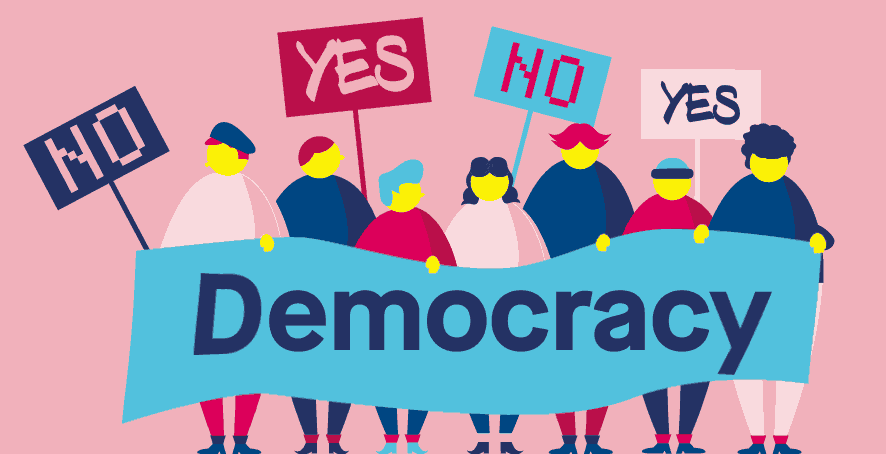Autocracies on the Rise
Two reports on the state of democracy around the world
Just one in five people live in a free country today, according to Freedom House’s latest annual report. This number was almost twice as high just two years ago, with last year’s developments marking the sad continuation of a 16-year decline in global freedom. In the latest edition of its Transformation Index, the Bertelsmann Foundation also observes an increasing autocratisation of the world. For the first time since 2004, there are more autocracies than democracies among the countries included. Notwithstanding this troubling development, civil societies in many states around the world prove that democracy and freedom continue to be very appealing.
The Washington-based think tank Freedom House makes a worrying observation in its 2022 report: Attacks on liberal democracy are on the rise. Authoritarian regimes have become more effective at co-opting the norms and institutions meant to support basic liberties and authoritarian forces continue to exploit weaknesses in the political systems of liberal democracies.
The Bertelsmann Foundation’s Transformation Index (BTI) analyses and compares the quality of democracy, market economy and governance in developing and transition countries around the world. The 2022 edition of the BTI examines 137 countries. For the first time since 2004, autocracies outnumber democracies among the selected states at 70 countries. According to the Bertelsmann Foundation, almost one in five democracies has seen its quality decline over the past ten years, including regionally important and once stable democracies. These include large democracies such as India and Brazil as well as the European countries Bulgaria, Poland, Serbia and Hungary – all of which have lost more than one point on the BTI’s ten-point scale since 2012 and are now only considered defective democracies. A major reason for this development, according to the think tank, is a one-sided focus on securing political and economic power on the part of political elites, to which any social and economic development is subordinated.
Defending Democracy
Russia and ten other threats to democracy
Since 24 February 2022, the term “militant democracy” has taken on a different ring. Originally referring to the defence of democratic norms and institutions against domestic anti-democratic actors, it has now become impossible not to think of external military threats as well – a danger which had previously receded into the background in many parts of the world. A new volume of essays by the Konrad Adenauer Foundation examines the wide range of internal and external threats to German democracy – from extremism and polarisation, to authoritarianism and nationalism, to military threats and cyberattacks.
Facts and Public Life
How differently do Europeans see the world?
The Covid-19 pandemic has revealed a surprising level of distrust of scientific authorities in many countries, despite widely available information on the virus and vaccinations. But a trend towards a polarised and fragmented public, with political discourse based less and less on commonly accepted facts, has been evident around the world for some time. The United States are a striking example, where even the result of the last presidential election is now doubted by parts of society. Under the label “truth decay”, researchers from the RAND Corporation have investigated the extent, causes and consequences of this development – first for the US and now, in a new study, for Europe.
Kingdom of Kleptocrats?
How post-Soviet elites launder money and reputations in the UK

Western sanctions against Russian oligarchs since Russia’s invasion of Ukraine have thrown a spotlight on the influence of Russian elites in the UK. Experts have long warned that London in particular has served as a safe haven for the corrupt money of wealthy elites from former Soviet republics since the 1990s. Recently, the anti-corruption organisation Transparency International estimated that 1.5 billion pounds worth of property was bought by Russians accused of corruption. The links between Russian money and British business, politics and society not only damage the country’s reputation on the world stage, but also threaten to undermine the integrity of British institutions. A Chatham House report details the UK’s kleptocracy problem and outlines strategies for British policy.
Post-Pandemic Democracy
Taking stock after two years
Elections in the Digital Age
New risks for democratic integrity

Digitalisation poses new challenges to the integrity of elections in democratic states around the world. While it provides possibilities for more efficient digital voting systems and new opportunities for civic education and online communication, cyberattacks, trolls and social bots are damaging democratic processes. Foreign disinformation campaigns and Russian hacker attacks have become a serious threat to democratic elections. In a study by the Centre for International Governance Innovation, an interdisciplinary team of experts sheds light on the various aspects of the issue and makes recommendations for policymakers.

Divisive Politics
Polarisation and democratic risks in Latin America
For the first time in Colombia’s history, a left-wing candidate, Gustavo Petro, won the presidential election in June 2022. The election continues a multi-year shift in Latin America, where left-wing politicians already won majorities in Chile, Peru and Honduras in 2021. At least as remarkable, however, is the fact that Petro’s populist rival was not a member of any of the established parties either. An increasing rejection of traditional politics and the rise of populists characterises the politics of a number of Latin American countries. A volume of essays by the Carnegie Endowment for International Peace assesses the political developments in six countries in the region that have experienced social tensions and polarisation in recent years.
Contributors to this issue:
Team KALUZA + SCHMID Studio, Bogdan Miftakhov, Johannes Sudau, Kristin Wesemann
Sources
(1) Freedom in the World 2022. The Global Expansion of Authoritarian Rule. Freedom House, February 2022.
Transformation Index BTI 2022. Verlag Bertelsmann Stiftung, Gütersloh 2022.
(2) Die wehrhafter(re) Demokratie. Russland und zehn weitere Gefahren für unsere Demokratie. Konrad-Adenauer-Stiftung, July 2022.
(3) Devaux, Axelle, Sarah Grand-Clement and Stijn Hoorens. Truth Decay in Europe. Exploring the role of facts and analysis in European public life. RAND Corporation, 2022.
(4) Heathershaw, John, Alexander Cooley, Tom Mayne et al. The UK’s kleptocracy problem. How servicing post-Soviet elites weakens the rule of law. Chatham House, December 2021.
(5) The Global State of Democracy In Focus. Taking Stock After Two Years of Covid. International Institute for Democracy and Electoral Assistance, April 2022.
(6) Bradshaw, Samatha Kailee Hilt, Eric Jardine et al. Next-Generation Technology and Electoral Democracy: Understanding the Changing Environment. Centre for International Governance Innovation, March 2022.
(7) Carothers, Thomas and Andreas E. Feldman (ed.). Divisive Politics and Democratic Dangers in Latin America. Carnegie Endowment for International Peace, 2021.


